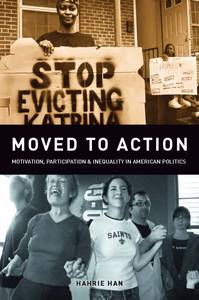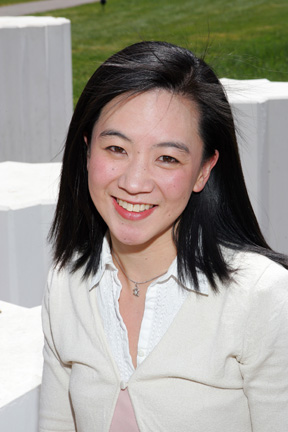What Motivates People to Participate in Politics?
Wellesley College's Hahrie Han's New Book Says Its All About Caring
and Connection
FOR IMMEDIATE RELEASE:
October 1, 2009 |
|
 |
Strong personal commitments — such as the quality of children’s education — can push the disadvantaged to get to the voting booth, argues Wellesley's Hahrie Han in her new book.
|
 |
WELLESLEY, Mass. -- At the time of the first mayoral election following Hurricane Katrina, more than half of New Orleans’ population had not returned to the city — particularly the poor, less-educated, African-American residents. Despite their absence, turnout in heavily black precincts increased from earlier elections, as citizens sent in absentee ballots and arranged charter buses to polling places. Their participation defied the standard model of wealthy, educated and privileged voters.
“Most political science research assumes that people are motivated through political interest — that is, people must be politicized before they participate, so that they have a general interest in and knowledge about politics,” said Hahrie Han, the Sidney R. Knafel assistant professor of social sciences in the Department of Political Science at Wellesley College. “Research shows, however, that the affluent are much more likely to have this interest and knowledge then the disadvantaged.”
So, what does motivate marginalized citizens, with little political interest and few resources, to vote?
Han aims to answer that question in her new book, Moved to Action: Motivation, Participation, and Inequality in American Politics (Stanford University Press, 2009).
Through in-depth interviews with political activists and large-scale survey data, Han studied how the disadvantaged became motivated to participate in politics. She found that highly personal commitments — such as the quality of children’s education or the desire to help a friend — exert an impact on getting disadvantaged people to the voting booth.
“The underprivileged do get involved, as exemplified by the participation of Katrina refugees,” Han writes in Moved to Action. “These former residents of the poor neighborhoods hardest hit by the hurricane participated even though they did not have the high levels of income and education commonly associated with high levels of participation. In this specific instance, on this specific issue, these individuals were highly interested, informed and motivated because they cared deeply about the end being sought.”
Han argues that civic and political organizations can increase citizen participation by helping people realize the connections between the personal and political in their lives.
Her bookhas drawn praise for its path-breaking ideas. "Moved to Action is an urgently welcome contribution to our understanding of political participation,” said Taeku Lee of the University of California, Berkeley. “Hahrie Han aims to get at the root of when and why individuals with threadbare resources and limited networks become politically active.
“Few issues in American politics are as important as political inequality,” noted Andrea Louise Campbell of the Massachusetts Institute of Technology. “In this fresh, compelling book, rising star Hahrie Han shows how we can increase political participation and reduce inequality by fostering issue interests through group memberships, especially among lower SES individuals.”
Han is a fellow in the Robert Wood Johnson Scholars in Health Policy Research Program at Harvard University for 2009-2011. She acted as co-convener of a policy advisory group for Senator Barack Obama’s presidential campaign in 2008 and served as national issues and policy advisor to Senator Bill Bradley’s presidential campaign in 1999-2000.
Her research focuses on political participation, political organizing, the role of organized interests in American politics and congressional elections. Her work has been published in the British Journal of Political Science, American Journal of Sociology, Legislative Studies Quarterly and Political Behavior. She received Stanford University’s Centennial Teaching Award in 2002 and Wellesley’s Apgar Award for Innovative Teaching in 2006.
Wellesley College has been a leader in liberal arts and the education of women for more than 130 years. The College's 500-acre campus near Boston is home to 2,300 undergraduate students from 50 states and more than 65 countries.
### |

